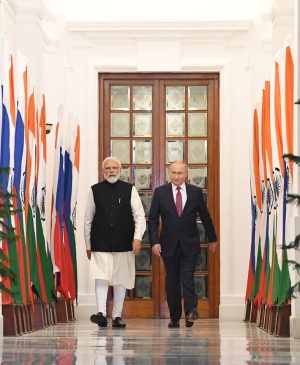Russia’s invasion of Ukraine on February 24 has put India in a particularly difficult spot. Since the conflict between Moscow and the U.S. over Ukraine began escalating late last year, India has avoided taking sides. But with Moscow’s invasion of Ukraine, that cautious approach will become increasingly untenable for New Delhi. It could hurt India’s interests in the long-run.
On January 31, India abstained from voting on whether the United Nations Security Council (UNSC) should take up discussion of the situation in Ukraine as a threat to international peace and security.
Unlike the confrontational statements of the U.S. and its allies, India’s statements are conciliatory, peppered with words like “restraint,” “de-escalation,” and “diplomatic dialogue.” Importantly, India has avoided condemning or calling out Russia for its actions in Ukraine.
India is “neutral” in the conflict, India’s junior Minister for External Affairs Rajkumar Ranjan Singh said on Thursday, hours after Russian troops and tanks crossed the border into Ukraine on President Vladimir Putin’s orders to carry out a “special military operation” there.
However, India’s position is not neutral. Not only is its position different from that of the NATO powers, but also it has been soft on the Russians.
That India was not on the same page as the U.S. on the Ukraine crisis was underscored during the Quad foreign ministers meeting at Melbourne in February. Unlike the U.S., Japan, and Australia, who were strongly critical of Russia’s massing of troops along its border with Ukraine, India chose to remain silent. Their differences were significant and could not be bridged during the meeting, as was evident from the fact that the Quad joint statement made no mention of Ukraine.
That India is not neutral in the conflict was made clear again during the UNSC debate on February 22, which followed soon after Putin announced a decree recognizing the independence of separatist regions Donetsk and Luhansk in eastern Ukraine. In his statement, India’s Permanent Representative to the United Nations T. S. Tirumurti expressed “deep concern” over the “escalation of tension” along the Russia-Ukraine border but did not condemn Russia’s actions. Indeed, the statement referred only to “these developments” and made no mention of Russia’s actions.
India’s reluctance to condemn Russia has evoked criticism. A Western diplomat based in New Delhi said that India’s reluctance “to stand shoulder-to-shoulder with democratic countries” against Russia’s recent actions in Ukraine is “disturbing.” India’s failure to speak up against “naked aggression does not behoove a country that claims to be a responsible power,” he told The Diplomat, adding that New Delhi’s “sitting on the fence” in the Ukrainian conflict would “impact its growing relations with the U.S. and other Western powers.”
Rejecting the allegation over India’s “fence sitting,” an official in India’s Ministry of External Affairs pointed out that New Delhi has been “engaging with all sides.” India’s approach is “mindful of the fact that all parties have legitimate security interests” and these “should be fully taken into account,” the MEA official said.
India’s view on the current crisis is that it is not just the outcome of Russia’s actions.
Speaking on the sidelines of the Munich Security Conference on February 19, India’s Minister for External Affairs S Jaishankar pointed out that the conflict over Ukraine “derives from the post-Soviet politics, the expansion of NATO, the dynamics between Russia and Europe, and Russia and the West broadly.”
India’s dilemma in the conflict over Ukraine is that it is caught between two friends – Russia, its longstanding friend and foremost defense supplier, and the U.S., a more recent friend and partner in Quad, whose support it needs to counter China.
Complicating India’s dilemma is the fact that the conflict over Ukraine is unfolding at a particularly difficult time for India. Since May 2020, tensions between the Indian and Chinese armies have been mounting; both sides have amassed a large number of troops and military hardware along their disputed border. Several rounds of talks have not resolved the crisis and analysts are not ruling out the possibility of a war.
Since 60-70 percent of India’s military hardware is of Russian origin, India is dependent on Russia for equipment and spares, a fact it cannot ignore especially at a time when a military confrontation with China is possible.
While this is an important concern for India, New Delhi cannot ignore the fact that Russia’s actions in recent weeks have enormous long-term implications for India’s national security. The crisis in Eastern Europe will benefit China as it is likely to keep the U.S. bogged down in Europe. It will force the U.S. to shift focus from the Indo-Pacific to Europe. A situation that benefits China is not in India’s interest, especially in the context of their increasingly hostile relationship.
Besides, Russia’s actions in Ukraine, its declaration of independence of separatist regions in Ukraine and then following that up with an invasion, set a bad precedent, which could have implications for India. It could encourage other countries, like China and Pakistan, for example, to pursue a similar route to occupy territories they covet. This was a strategy that the U.S. used to carve Kosovo out of Serbia in 1999.
The coming weeks and months are likely to see the UNSC discuss and debate Russia’s invasion of Ukraine. Will India continue to abstain?
India could follow a more nuanced position on the crisis. While stressing and supporting Russia’s security concerns, New Delhi should stand up in support of Ukraine’s sovereignty and territorial integrity.
In 1962, even as the United States and the Soviet Union were locked in an eyeball-to-eyeball confrontation over the Cuban missile crisis, India and China were fighting a short but brutal war in the Himalayas. Sixty years later, the U.S. and Russia are facing off over Ukraine and the world’s eyes are fixated on Eastern Europe. Will history repeat itself? Will China be tempted to carry out a swift military action against India? The possibility cannot be ruled out.













